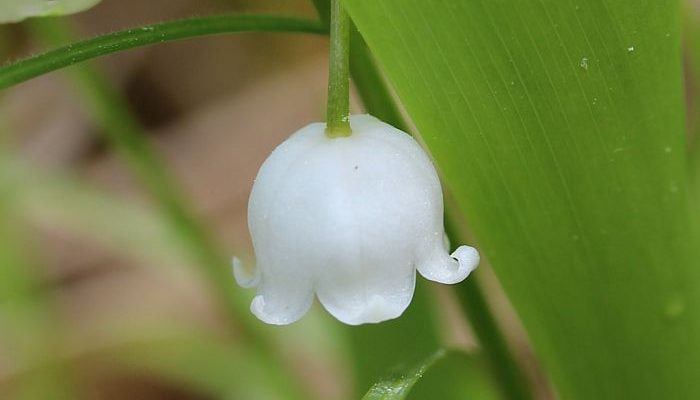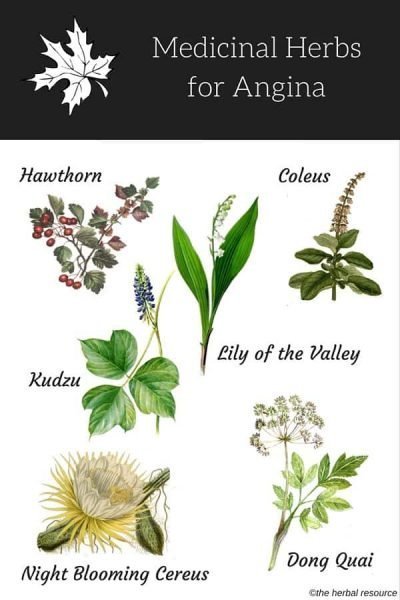Angina or angina pectoris is defined as an intermittent pain, pressing or constriction of the chest that is exacerbated by exercise and relieved by rest.
Before using herbal remedies for angina symptom relief and treatment, it is vital to seek out professional help and get a full diagnosis of angina.
Those experience an increase in the severity of their symptoms at any time must immediately seek emergency medical care.
Medicinal herbs for angina treatment have been employed traditionally for hundreds of years and now many scientific studies indicate that these traditional applications might have some merit.
Today, combinations of medicinal herbs to relieve angina symptoms will almost certainly contain hawthorn.
Arteriosclerosis is often the underlying cause of angina. It is essential that people who have been diagnosed with angina, also investigate arteriosclerosis and its treatment.
Commonly Prescribed Herbs for Angina Pectoris
Hawthorn
Hawthorn berries (Crataegus oxyacantha) are known to relieve angina pectoris and reduce blood pressure and also to treat orthostatic hypotension, where blood pressure drops abnormally upon standing.
Hawthorn works by increasing stroke volume, where the amount of blood per heartbeat is increased, and lowering blood pressure and pulse rate. Hawthorn also dilates the peripheral blood vessels which improve circulation. (1)(2)
Coleus
Like hawthorn, coleus forskohlii increases stroke volume; it also reduces the risk of blood clots and lowers blood pressure by acting to relax the arterial walls.
Coleus is a unique herb as it elevates cyclic amp which boosts the body’s metabolism. (3)
Night Blooming Cereus
Night blooming cereus (Selenicereus grandiflorus), as the name suggests, blooms on sunset and declines within a day.
This herb is native to Jamaica and Northern America, where it was referred to as “pain in the heart” by the Shoshone Indians.
Preparations are made of the young stems and flowers which have a fragrance similar to vanilla.
Night blooming cereus may be useful where there is an irregular heartbeat and where the use of a mild diuretic will be of benefit. (4)
Low doses of night-blooming cereus, 10–100 mg QD once or twice a day are regarded as clinically effective.

Lily of the Valley
Lily of the valley (Convallaria majalis) acts in a similar way to coleus and hawthorn, and it is indicated where a diuretic action is also of benefit where the pulse is feeble and weak.
Convallaria slows and regulates the heartbeat and lowers blood pressure. (6)
Lily of the valley is often prescribed where there is mild heart failure associated with aging and is considered to be safer and to have fewer side effects than foxglove.
Other Herbs Used for Angina Treatment
- Khella – (Ammi visnaga)
- Bilberry – (Vaccinium myrtillus)
- Dong Quai – (Angelica sinensis)
- Kudzu – (Pueraria lobata)
- Hawthorn – (Crataegus laevigata, Crataegus monogyna)
- Avocado – (Persea americana)
- Pheasant’s Eye – (Adonis vernalis)
- Red Sage – (Salvia miltiorrhiza)
Non-Herbal Supplements for Angina Pectoris
In addition to using herbal remedies for angina pectoris symptom relief, the amino acid, L-Carnitine (one gram twice daily), may be of benefit for congestive cardiac failure (CCF) and angina. (7)
Coenzyme Q-10 (15 to 100mg daily) might be useful as a supportive therapy by improving oxygen utilization and energy production, especially targeting heart muscle. (8)
Magnesium (450-600mg daily) might be useful as it has been shown to relax the blood vessel walls and in helping to regulate blood pressure. (9)
Medicinal herbs to relieve angina pectoris symptoms can be found in combination with these supplements to enhance their action.
Vitamin E and fish oil have also been thought to ease angina symptoms. (10)
Medicinal herbs to relieve angina symptoms are usually taken at low doses only, and many herbs for angina treatment need to be monitored for their drug interactions.
These herbs must be taken under the supervision of a professional healthcare provider.
It is vital that any supplementation is discussed with a healthcare professional before use, and should any symptoms become more severe at any stage, seek emergency care without delay.
Supporting References
- Jalaly, L., Sharifi, G., Faramarzi, M., Nematollahi, A., Rafieian-kopaei, M., Amiri, M., & Moattar, F. (2015). Comparison of the effects of Crataegus oxyacantha extract, aerobic exercise and their combination on the serum levels of ICAM-1 and E-Selectin in patients with stable angina pectoris. Daru : journal of Faculty of Pharmacy, Tehran University of Medical Sciences, 23, 54. doi:10.1186/s40199-015-0137-2.
- Tassell, M. C., Kingston, R., Gilroy, D., Lehane, M., & Furey, A. (2010). Hawthorn (Crataegus spp.) in the treatment of cardiovascular disease. Pharmacognosy reviews, 4(7), 32–41. doi:10.4103/0973-7847.65324.
- Jagtap, M., Chandola, H. M., & Ravishankar, B. (2011). Clinical efficacy of Coleus forskohlii (Willd.) Briq. (Makandi) in hypertension of geriatric population. Ayu, 32(1), 59–65. doi:10.4103/0974-8520.85729.
- Rashmi, Rajat & Mishra, Divya. (2016). Pharmacognostical and phytochemical evaluation of Cactus grandiflorus (L.) Britton and Rose. Indian Journal of Research in Homoeopathy. 10. 167. 10.4103/0974-7168.188225.
- Matsuo, Y., Shinoda, D., Nakamaru, A., Kamohara, K., Sakagami, H., & Mimaki, Y. (2017). Steroidal Glycosides from Convallaria majalis Whole Plants and Their Cytotoxic Activity. International journal of molecular sciences, 18(11), 2358. doi:10.3390/ijms18112358.
- Stansbury, Jill; Saunders, Paul; Winston, David; Zampieron, Eugene R.: The Use of Convallaria and Crataegus in the Treatment of Cardiac Dysfunction. Journal of Restorative Medicine, Volume 1, Number 1, 9 January 2012, pp. 107-111(5).
- Mingorance, C., Rodríguez-Rodríguez, R., Justo, M. L., Alvarez de Sotomayor, M., & Herrera, M. D. (2011). Critical update for the clinical use of L-carnitine analogs in cardiometabolic disorders. Vascular health and risk management, 7, 169–176. doi:10.2147/VHRM.S14356.
- T. Tran, Mongthuong & M. Mitchell, Tina & T. Kennedy, Daniel & T. Giles, Joel. (2001). Role of Coenzyme Q 10 in Chronic Heart Failure, Angina, and Hypertension. Pharmacotherapy. 21. 797-806. 10.1592/phco.21.9.797.34564.
- Redwood, Simon & Bashir, Yusuf & Huang, J & W Leatham, E & Kaski, Juan & Camm, John. (1997). Effect of magnesium sulphate in patients with unstable angina. A double blind, randomized, placebo-controlled study. European heart journal. 18. 1269-77. 10.1093/oxfordjournals.eurheartj.a015438.
- Raphael, C. W., & Conaway, D. G. (2012). Nutritional and vitamin supplements: do they prevent coronary artery disease?. Missouri medicine, 109(3), 204–209.
Thordur Sturluson
Latest posts by Thordur Sturluson (see all)
- What is the Difference Between Hemp and Marijuana? - June 3, 2019

Leave a Reply